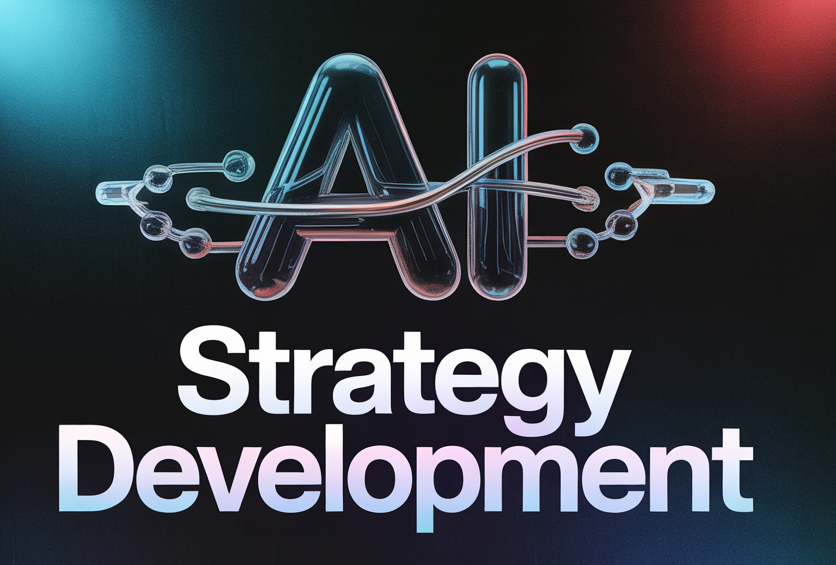Home / Blog / AI Strategy Development: How to Build a Practical Roadmap for Business Growth
This blog explores how businesses can develop a results-driven AI strategy that supports growth, efficiency, and innovation. It breaks down the core components of a strategic AI roadmap and offers practical steps to help leaders plan and implement AI in a way that delivers measurable value
30 Jun, 2025

Introduction: Why Every Business Needs an AI Strategy?
AI is no longer a future investment, it's a current necessity.
From automating repetitive tasks to enhancing customer experience and optimizing decision-making, artificial intelligence is becoming a key enabler of modern business operations. But without a clearly defined strategy, adopting AI can lead to disjointed efforts, wasted resources, and underwhelming results.
That’s where AI strategy development comes in a structured, goal-driven approach to integrating AI into the core of your business.
What Is AI Strategy Development?
AI strategy development is the process of planning and designing how artificial intelligence will be applied across your business to achieve specific outcomes.
It covers everything from defining goals and selecting the right technologies, to preparing your data infrastructure and workforce. Done right, it turns AI from a buzzword into a driver of growth and innovation.
At its core, a good AI strategy answers key questions:
The Viral Shift: From AI Hype to AI Alignment:
Social platforms and media feeds are filled with viral stories of AI breakthroughs image generators, chatbots, and autonomous tools. But viral tools don't equal strategic value unless they’re mapped to real business needs.
The shift happening now is clear: Businesses are moving from playing with AI to planning with AI.
A viral LinkedIn post might showcase AI automating emails. A smart business leader sees that and asks: Can we automate customer onboarding? Improve lead qualification? Optimize internal reporting?
That’s the difference strategy makes.
Business Impact of an Aligned AI Strategy:
A strong AI strategy can deliver measurable outcomes across departments:
AI done without strategy creates isolated wins. AI done strategically becomes a competitive advantage.
Real-World Applications of Strategic AI Planning:
1. E-Commerce Company
Scaling Operations:
An online retail brand used an AI
strategy to identify friction points in checkout and logistics. Result?
AI-driven inventory optimization and a 15% reduction in delivery delays.
2. B2B SaaS Platform
Enhancing Product Experience:
By mapping user behavior, the
team used AI to recommend features proactively, increasing engagement and
reducing churn by 20%.
3. Manufacturing Firm
Automating Quality Checks:
With AI-enabled visual inspection
tools, error detection improved and manual checks dropped by 60%, saving time
and labor.
These results didn't come from isolated experiments, they came from having a strategy that aligned AI with core business goals.
Challenges to Consider in AI Strategy Development:
Before jumping into implementation, companies should be aware of key roadblocks:
These challenges don’t mean “don’t use AI.” They mean “plan well before you do.”
How to Develop a Practical AI Strategy?
To get started, businesses should follow a clear roadmap:
1. Define Business
Objectives
Start with what matters most. Are
you trying to reduce costs, boost customer satisfaction, or enter a new market?
Align AI use cases with those goals.
2. Audit Your Data
Ecosystem
Evaluate the data you currently
have, its quality, accessibility, and gaps. AI is only as good as the data it
learns from.
3. Identify
High-Impact Use Cases
Prioritize projects with clear
ROI potential. Consider automation, personalization, forecasting, or customer
interaction enhancements.
4. Decide on Build
vs. Buy
Determine whether to develop
custom AI models internally or leverage third-party platforms and APIs.
5. Prepare Teams and
Governance
Invest in employee training,
cross-functional collaboration, and ethical AI guidelines. Establish KPIs and
review cycles.
6. Pilot, Measure,
Scale
Run small experiments, measure
success, and scale successful initiatives across teams or geographies.
This structured approach ensures AI investment delivers real business results not just hype.
The Future of AI Strategy in Business:
AI is becoming foundational, not optional. Leaders who treat it as a strategic layer integrated with goals, data, culture, and customer expectations will outperform their peers.
A well-developed AI strategy won’t just help you adopt tools. It will help you evolve as a smarter, faster, more adaptive organization.
As artificial intelligence becomes more accessible and powerful, the companies that win won’t be those with the most algorithms but those with the clearest vision for using them.
Future-proof your business with an AI strategy that’s built to perform. 10turtle helps you connect goals, data, and execution intelligently.